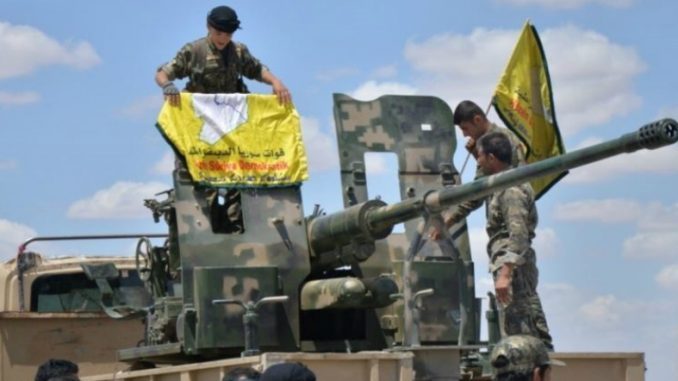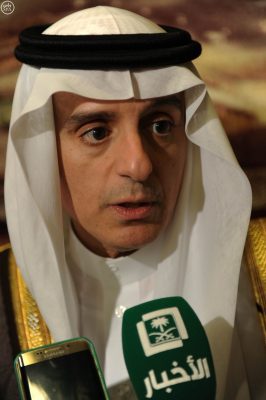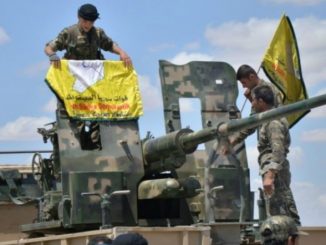
The ceasefire agreement the Russian president Vladimir Putin announced was between the Syrian opposition and Assad regime without any mention again for the Syrian Kurds, a move that may complicate the already fragile situation.
Russia, Iran, and Turkey are the countries that have the strongest impact on the Syrian crisis due to their military presence in the country. Syria
The three countries said they were ready to help broker a Syria peace deal after the three countries held talks in Moscow on Tuesday and adopted a new declaration to facilitate the process, ignoring the US administration and its European allies and saying those may be invited later.
Russian President Vladimir Putin said that that Syrian opposition groups and the Syrian government had signed a number of documents including a ceasefire deal that will be guaranteed by Turkey and Russia.
The documents include a ceasefire agreement between the Syrian government and the opposition, measures to monitor the ceasefire deal and a statement on the readiness to start peace talks to settle the Syrian crisis, Putin said.
The agreement didn’t include the Syria Kurdish groups and militias, as they have been also excluded from previous peace talks hosted by the UN in Geneva.
Syria’s Kurdish Democratic Union Party (PYD) was not invited to join the new ceasefire deal in Syria, the party co-chairman, Saleh Muslim said.
“We aren’t included… Nobody asked us to join the truce because countries in the region deny that there is a nation called Kurds,” Muslim said.
Some Kurdish groups declared the establishment of a new opposition group to be bale te take part in the future
The establishment of the Syrian Democratic Front was announced on Monday. The organization’s spokeswoman, Mais Krydee, told Sputnik that the front consists of the Committee for National Democratic Action in Syria, the Syria National Dialogue Committee with its four parties, and a Kurdish group.
Mahmoud Marai, the secretary general of the Syrian Democratic Front, said earlier on Thursday that the group was ready to take part in peace talks on Syrian reconciliation in Astana.
Saleh Muslim said also said that the establishment of the Syrian Democratic Front that unites broad forces of the internal opposition and Kurdish groups, will not lead to Kurdish engagement in the intra-Syrian talks in Astana and Geneva.
“I do not think that establishment of this opposition group will help to engage Kurds into talks and help to solve Kurds’ question,” Saleh Muslim said.
The Kurdish issue and US role
The US administration may use the Kurdish issue as a pressure card against the Russian-Turkish resolution.
The US administration has been backing the Kurdish militias for years, calling them partners in the fight against ISIS. This support gave them the tools to expand their territory and pose a major threat to both Turkey and Syria’s unity.
In fact, Kurdish militias use US support to launch offensives against new areas under the term of fighting ISIS, while the force the Arab citizens to flee their homes, so the Kurdish militias can force control over new areas and add it to their cantons.
This plan was made clear when the Syrian Kurdish militias and their allies said on Thursday they approved a blueprint for a system of federal government in northern Syria, reaffirming their plans for autonomy at the same time when Russia and Turkey declared the ceasefire deal.
The aim is to cement the autonomy of areas in northern Syria where Kurdish groups have already carved out self-governing regions since the start of the war in 2011.
On 17 March 2016, the Kurdish groups also self-declared the establishment of a federal system of government as the Federation of Northern Syria–Rojava.
This move linked with Saleh Muslim’s statement show the Kurdish willingness to undermine any future of Syria where they don’t have their own state, and hint the US shadow game behind it.
In fact, the United States has boosted supplies of weaponry to the Syrian Kurdish Democratic Union Party (PYD), Turkish media reported on Wednesday, citing its sources.
On December 24, the US ambassador to Turkey said the United States did not provide direct military support to the PYD. However, according to the Anadolu news agency, in the last two weeks alone the US weaponry was delivered three times to the northeastern Syrian province of Hasakah.
The agency claims that on the day the ambassador made his statement, a plane with US weapons on board landed at the Rumeilan airport. The weapons then were reloaded into US Army helicopters and delivered to other regions of the country, Anadolu explained.
According to the agency’s sources, the latest major weapons delivery to the northern regions of Syria took place late on Tuesday. Moreover, dozens of heavy trucks have left Erbil in northern Iraq to reach regions of Syria controlled by the Kurdish self-defense forces, Anadolu added.
However, some say that the US administration is using the Kurdish issue only as a temporary pressure paper as it has done before. In fact, the US ordered the Kurds to step aside from the Turkish border and to move their forces out of Turkey’s safe belt after it reached an agreement with Turkey. So the US may be planning the same move and will drop its support for the Kurds once its tole in the coming Syria peace talks is suaranteed.
So the US may be planning the same move and will drop its support for the Kurds once its tole in the coming Syria peace talks is suaranteed.



